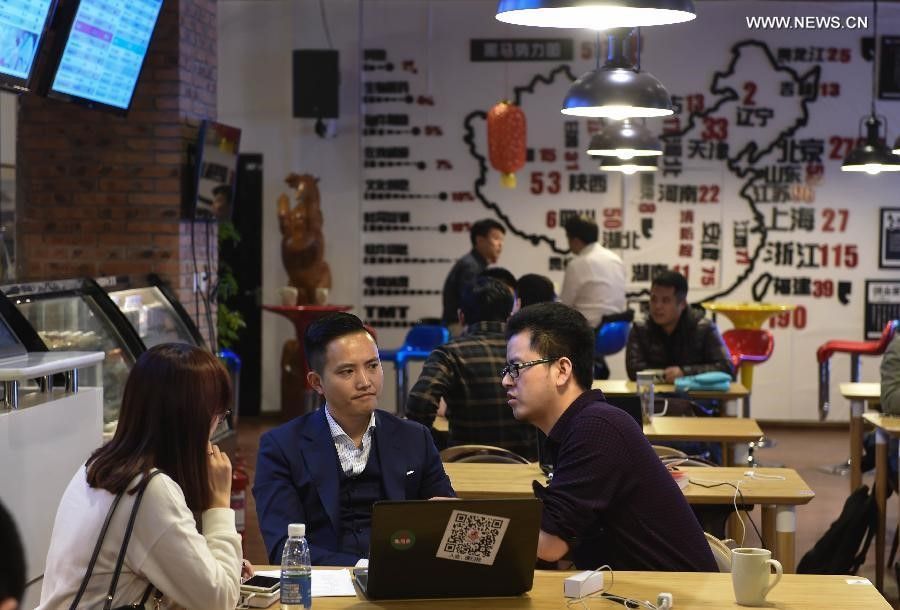Start-up Buzz in Asia from Beijing to Tel Aviv
Internet Plus Asia
Start-up wave in Silicon Valley USA, mecca of the Tech world, captivated young entrepreneurs in East Asia, South East Asia, South Asia, Central Asia and the Middle East, from Beijing to Tel Aviv. Following the footsteps of the Silicon Valley in USA , Start-up hubs sprouted up in many Asian cities: Zhongguancun in Beijing; Ho Chi Minh City in Vietnam; Teheran-ro in Korea; Golden Triangle in India (Chennai, Hyderabad, Bangalore); Philippine; Thailand; Singapore; Cyber Jaya in Malaysia; Indonesia; Iran ,Taiwan, Silicon Wadi in Jordan; Pakistan; Dubai in UAE; Israel’s Silicon Wadi in Tel Aviv. Asia had become a center for innovation and a fertile ground for start-up ecosystems. In Asia, China nurtured the most number of Unicorns and start-ups in the last 5 years and homegrown giants, Alibaba, Baidu, Tencent had spun off employees to start their own ventures. According to Forbes, Zhonggguancun is 2nd only to Silicon Valley in terms of the number of Unicorns and Start-ups. Asia is a promising land, an oasis for Venture Capitalists due to the low cost of operations, availability of skilled personnel and commitment from the Governments.

Zhongguancun becomes the cradle of China’s Tech Revolution - Beijing’s Zhongguancun Science Park has become an incubator, attracting nearly 2,000 start-ups in recent three years. Just as Stanford is linked to Silicon Valley, Tsinghua and Peking Universities entwined with the growth of Zhongguancun (Photo credit Xinhua/Luo Xiaoguang)

Figure: Bee hive diagram of China Unicorns having over US$ 1Billion Valuation- China leads Asia and home to one-third of the world’s Unicorns
Growing list of success stories shows new horizons for Asia. Messaging app Wechat in China is on the path to overtake Whats APP and Facebook. Bike hailing app of Go-Jek provides a solution to traffic congestion in Jakarta. Lazada a Malaysian e-tailer had captured the top position in e-Commerce in most of the ASEAN countries. Digi Kala e-commerce platform is the largest online retail market in the Middle East, overtaking Amazon. E-Commerce Platforms in Dubai and Jordan Souq.com, MarkaVIP and Jordan’s web portal Makatoob inspired many in Arab World.
Audacious and inventive new breed of entrepreneurs in these melting pots will drive the economy forward in Asia. The economic progress of the Asian nations are closely linked to the new start-ups. Government policies in Asian nations are mostly conducive for new start-ups as the governments realize that the young firms act as the employment engine of the economies while making the countries ready for Web3.0 and Industry 4.0.
China is the Nucleus of Innovation in Asia, India is the next and South East Asia the closest 3rd, the Middle East is promising |


Figure: Three National Strategies, “One Belt One Road”, “Internet Plus”, “Made in China 2025” drive china’s innovativeness in Digital Technologies
THREE STRATEGIES ADOPTED BY THE CHINESE GOVERNMENT DRIVE INNOVATION, DIGITAL ECONOMY, ENTREPRENEURSHIP AND START-UP ECONOMY.
IT WILL TRANSFORM LIVES OF PEOPLE NOT ONLY IN CHINA BUT ALSO IN ALL THE ASIAN COUNTRIES ALONG THE TERRESTRIAL SILK ROAD AND MARITIME SILK ROAD.
The depth of commitment of China on Start-up and Technology innovation is shown clearly in the following programs.
01 - "Internet Plus" Strategy
“Internet Plus” Strategy mooted by Chinese Premier Li Keqiang of China in 2015 with the objective of integrating Internet, Big Data, AI, IoT and Cloud Computing to boost e Commerce, e Health, Fin Tech, EduTech, Travel Tech etc, will drive the start-up initiatives in China and its collaborations in Asia.
02 - "Made in China 2025" Strategy
This strategy of Made in China 2025 (MIC2025) is the Chinese version of Industry 4.0. Under this strategy, China will integrate transformative information technologies such as IoT, M2M, Big Data, cloud computing and AI with smart manufacturing technologies such as Robotics to enhance added value and productivity. China envisions to reach advanced manufacturing economy status before 2025 by gaining a comparative advantage in Industry 4.0.
03 - "One Belt One Road" (OBOR) Strategy
OBOR was introduced in 2013 by President of China Xi Jin Ping with the objective of enhancing connectivity and collaboration among nations along the Silk Road economic Belts. Digital Silk Road component of OBOR covers the investment for Fibre Optic build out, smart cities, e Commerce hubs along the Silk Road. Good example is the setting up of a Digital Hub in Malaysia for Logistic, Payment and Cloud Computing.

Combination of “Internet Plus”, “Made in China 2025” and “One Belt One Road” strategies can create a Collaborative Smart Corridor along the Silk Road covering East, South East, South, Central Asia, and the Middle East. The interdependence of these three programs is clearly shown in the above diagram developed by the author. As the tech leader in Asia, Chinese Unicorns, Start-Ups, large digital enterprises, Accelerators and Venture Capitalists can play a pivotal role to build a collaborative ecosystem and a start-up culture in Asia. Many Asian start-ups had already forged game-changing win-win partnerships with Chinese counterparts.
China’s three strategy approach to innovation and cohabitation in the region is very effective in many ways.
01 – According to CB insight, China had created the highest number of Unicorns (Valuation above US$ 1 Billion) and the biggest Start-Up ecosystem in Asia. Out of 236 Unicorns in the world 65 are from China. (49% of Unicorns are from the USA, 28% Unicorns are from China, 4% are from India). India holds the 2nd biggest start-up ecosystem in Asia having 9 Unicorns.

02 – Chinese Unicorns had invested in Asia and globally. They have world in their sight. Examples.
- Didi Chuxing ride hailing Unicorn start-up had invested in other similar start-ups such as South East Asia’s Grab, India’s Ola, US’s Lyft, Estonia’s Taxify, Dubai’s Careem and Brazils’s 99
- Ofo Bike Sharing service, a Unicorn company (now invested by Didi Chuxing), extends it’s operations to Singapore, USA, UK and planning to have its presence in 200 cities in 20 countries shortly.
- Ant Financial which is an affiliate company of Alibaba Group run its Ali Pay online banking, consumer credit and carry the world’s largest money market fund. It is valued at $60 Billion in 2016. Ant Financial make big moves by forging partnerships in Asia, Europe and US. One 97(Pay tm mall) in India, Kakao Pay in Korea and Hello Pay in South East Asia. Ant Financial investment had brightened up the Asian Fin-Tech eco system.
03 – Leading Chinese digital companies like tech triumvirates Baidu, Alibaba and Tencent had invested in other start-ups in Asia by forging win-win partnerships, connecting Asia’s start-up eco-system. These partnerships even had got extended up to far west corners of Asia, Israel, the place where East meets West. For an example, the Chinese tech giant Baidu had invested in Pixellot, a Tel Aviv based video technology company. A joint China-Israel technology accelerator program was launched recently by a Chinese Venture Capital company in Beijing for the benefit of selected Israel ventures who have aspirations for the huge Chinese market.
The adventurous Chinese consumer would like to be a guineapig and are willing to be an early adopter. As a Western or American consumer, Chinese consumers are not too demanding and more than happy to experiment with the product and be a Co-Creator for product tasting, be opinion makers to build a viral effect. In addition to Government support, Angel’s and Accelerator’s backing, positive attitude towards digital services by early users create an environment that fosterinnovation.
Share This
Details
Mothilal is a Co Founder of Internet Plus Asia, a co-creation platform for tech start-ups in Asia. Prior to this he was a Chief Executive Officer, Chief Strategy Officer, Chief Corporate Officer and Chief Operating Officer of number of Telecommunications and IT companies in Asia and Pacific regions for over 20 years. He is a turnaround specialist and a strategist. As CEO and C level executives, he was responsiblefor transformation and turning around many telecos. He was also instrumental in winning many international awards for these companies such as GSM awards in 3 consecutive years, International Asia Pacific Quality Award, Asia CSR award. He has obtained the Doctor of Business Administration from PPA Business School, Paris, receiving a Distinction for his DBA research, "Corporate Venture Capital as an engagement model to Co-create 5G ready services in Telco - Startup collaboration"
